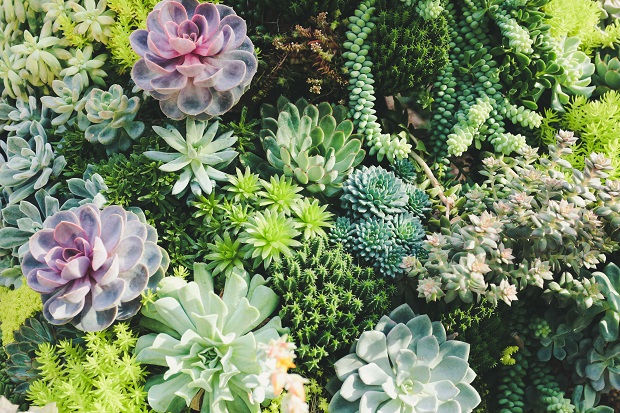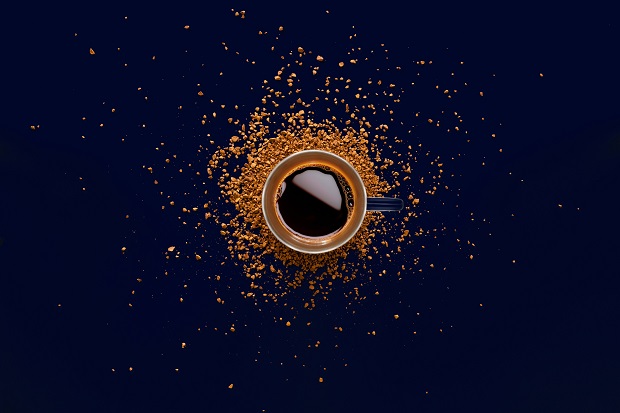Coffee grounds are extremely nutritious since they contain nitrogen. They also contain just trace amounts of calcium and potassium.
Overall, this suggests that using coffee grounds as fertilizer for your lawn can be a smart idea and that coffee grounds can be good for plants.
After much research and trial in my own garden, I can assure you that adding coffee grounds to your soil does indeed benefit your plants.
The reason? Coffee grounds enrich the soil with nitrogen – an essential nutrient that promotes healthy plant growth.

Table of Contents
Can You Really Use Coffee Grounds on Plants?
Coffee grounds are a great addition to compost, and you can put them right on the soil around the majority of yard plants if you are careful and don’t use excessive amounts.
Coffee grounds contain several key nutrients needed by plants, including:
- nitrogen
- potassium
- magnesium
- calcium
- other trace minerals
These are all the nutrients that plants need to grow. The coffee grounds are particularly rich in nitrogen, making them a great addition to compost, which benefits plant growth.
Furthermore, coffee grounds can assist in improving the soil’s structure and capacity to hold water.
Need a quite coffee grinder? Read our guide for the 10 best quiet coffee grinders in 2023
What are coffee grounds?
Essentially, coffee grounds are what’s left over after brewing a pot of coffee. They’re rich in organic material and have a strong smell that some people find quite pleasant.
But it’s not just their aroma that makes them interesting. Coffee grounds contain several key nutrients essential for plant growth including nitrogen, potassium, phosphorus, and other trace minerals.
Now, don’t get too excited just yet! While these nutrients sound great on paper (or screen), they’re not readily available for plant uptake immediately after being thrown onto your soil. It takes time for these materials to break down and release their nutrients into the soil where plants can utilize them.
Find the best espresso grinder under $1000 (2023)
What makes coffee grounds good for plants?
Let’s cut to the chase here – yes, used coffee grounds can benefit your plants, but with some caveats:
- Acidity Level: Contrary to popular belief, used coffee grounds aren’t acidic; the acid is water-soluble so it gets leached out during brewing leaving behind nearly neutral pH levels ideal for most plants.
- Nutrient Release: Like I mentioned earlier, while used coffee ground contains many beneficial nutrients such as nitrogen (essential for leafy growth), potassium (helps with flowering) and phosphorous (supports root development), they don’t immediately provide these benefits when initially added to the soil.
- Pest Deterrent: On top of providing nutrition to your plants indirectly through composting or mulching process over time, one surprising advantage is its pest deterrent quality. Some pests, such as slugs and cats, dislike the smell of coffee. So sprinkling grounds around your plants can help keep these critters at bay.
Keep in mind, though, that while used coffee grounds can be beneficial for your garden or indoor plants when used properly (e.g., composting before application), you should avoid solely relying on them as a primary source of plant nutrition.
The key is to incorporate it into a well-balanced organic matter and nutrient-rich soil environment for optimal plant health and growth.
Dive deeper: Turkish Coffee vs Espresso: Which One is Best For You?

How To Use Coffee Grounds for Plants in the Garden
Coffee lovers (or non-coffee lovers) here are easy and practical tips for using your used or leftover coffee grinds in your garden:
Using coffee grinds as compost
Composting is an excellent way to recycle organic waste and enrich your soil. So why not add used coffee grounds into the mix? They’re rich in nitrogen and add the necessary acid to compost heaps. When combined with brown materials like leaves or paper, it creates a balanced compost blend. Just remember:
- Balance is key; don’t use more than 20% of coffee grounds in your compost pile.
- Make sure to balance it out with “brown” material for optimal decomposition.
Using grounds from coffee as fertilizer
A cup of joe for you, a boost of nutrients for your plants! Coffee grounds contain minerals that are essential for plant growth, like potassium, calcium, and magnesium. Sprinkle them directly onto the soil around plants or mix them into potting soil before planting.
- Plants that love acidic soil (like roses or azaleas) especially benefit from this.
- Avoid using too much, as it can inhibit plant growth due to its caffeine content.
Using coffee grounds as a natural slug barrier
Slugs aren’t exactly our friends when it comes to gardening. Surprisingly enough though, coffee can help keep them at bay! By simply spreading a barrier of used coffee grounds around vulnerable plants, slugs will think twice before crossing over.
- It’s important to note that caffeine can harm some beneficial insects too.
- Replace the barrier after rainfall for maximum effectiveness.
Use the grounds as mulch
Mulching helps retain moisture in the soil and suppresses weeds—and guess what? Coffee does just that! But there’s one thing I’d caution against: Don’t apply thick layers because when dry they tend form moldy crusts which impede water absorption.
Use coffee grounds for great Vermicompost!
Worm composting, or vermicomposting, is a fantastic way to produce nutrient-dense soil. And worms absolutely love coffee grounds! It provides grit, aiding the worms’ digestion process.
- Coffee filters are also compostable and can be included in your worm bin.
- Just remember not to overfeed them with too many coffee grounds at once.
Coffee grounds can be used for weed removal
Weeds can be a real pain in the garden. Good news though—coffee grounds have allelopathic properties that inhibit weed growth. Sprinkle them lightly around your plants to help keep those pesky weeds at bay.
Use coffee grounds to fight off pests
Ants, beetles, mosquitoes… they’re not fans of caffeine either! Used dry ground spread around seating areas or playsets can deter these insects from hanging around too long. But remember:
- This method doesn’t completely eliminate pests but helps reduce their presence.
- Be careful not to harm beneficial insects like bees and butterflies.
So there you go! Next time you finish your morning cup of joe, think twice before tossing those used coffee grounds away. They could just be the secret ingredient your garden’s been waiting for!
How to Use a Cuisinart Coffee Maker: (Top in 2023)
Bottom Line
I’ve spent many a morning savoring my hot cup of coffee and pondering this question. Are coffee grounds really good for plants? The answer, quite simply, is yes. Coffee grounds indeed can be beneficial for various types of plants. They’re packed with nutrients like nitrogen, phosphorus, and potassium – all elements essential to plant growth.
But before you start showering your garden with yesterday’s coffee remains, there’s a bit more to understand about the hows and whys.
Coffee grounds are acidic in nature. This makes them ideal for acid-loving plants like azaleas or roses. But not every plant savors that acidity as much as we humans savor our morning brew. If you have plants that prefer alkaline soil, such as clematis or lilacs, it’s best to keep the coffee grounds away from them.
Some folks worry about caffeine harming their plants but fear not! Most of the caffeine is removed during brewing process so over-caffeination isn’t an issue here.
Here’s a quick rundown:
- Good for: Acid-loving plants like roses, azaleas
- Not recommended for: Alkaline-loving plants such as clematis or lilacs
Now let’s talk about how to use these brown nuggets of goodness effectively in your garden. Don’t just dump those wet lumps directly on top of the soil around your plant; it can create a moldy mess that doesn’t do anyone any favors.
Instead, mix those used grounds into the top layer of soil or add them to your compost pile where they’ll break down gradually and enrich the humus with their nutrient contents over time.
In conclusion (oops! I mean), when used thoughtfully and responsibly in gardening practice, coffee grounds can serve up more than just a great cup of joe—they could also help give your garden an extra boost it needs! It’s certainly a perk worth considering for any coffee-loving green thumb out there.
